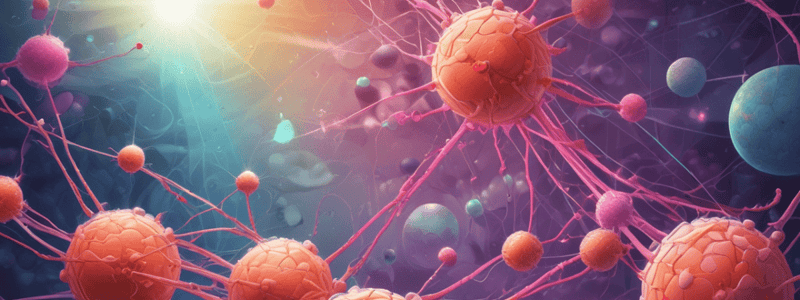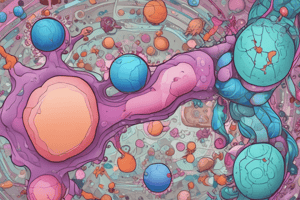Podcast
Questions and Answers
What is the primary source of Cancer Antigen 125 (CA 125)?
What is the primary source of Cancer Antigen 125 (CA 125)?
- Breast cancer cells
- Ovarian cancer cells (correct)
- Pancreatic cancer cells
- Prostate cancer cells
What is the cut-off value of CA 15.3?
What is the cut-off value of CA 15.3?
- 30 units/ml
- 35 units/ml (correct)
- 40 units/ml
- 45 units/ml
What is the normal level of PSA?
What is the normal level of PSA?
- 0-4 ng/ml (correct)
- 0-8 ng/ml
- 0-2 ng/ml
- 0-6 ng/ml
What is the upper limit of normal CA 50?
What is the upper limit of normal CA 50?
What is the cut-off value of PAP?
What is the cut-off value of PAP?
What is the primary use of LDH?
What is the primary use of LDH?
What precautions should be taken before taking serum samples for PAP assay?
What precautions should be taken before taking serum samples for PAP assay?
What is the type of CA 50?
What is the type of CA 50?
What is the primary function of tumor markers in cancer diagnosis?
What is the primary function of tumor markers in cancer diagnosis?
What is the significance of tumor markers in tissues?
What is the significance of tumor markers in tissues?
What is the ideal property of a tumor marker?
What is the ideal property of a tumor marker?
What is the clinical importance of tumor markers in cancer patients?
What is the clinical importance of tumor markers in cancer patients?
Where can tumor markers be present?
Where can tumor markers be present?
What is the role of tumor markers in staging?
What is the role of tumor markers in staging?
What is the significance of tumor markers in monitoring therapy?
What is the significance of tumor markers in monitoring therapy?
What is the structure of tumor markers?
What is the structure of tumor markers?
What is the primary function of Alpha Feto Protein (AFP) in early fetal life?
What is the primary function of Alpha Feto Protein (AFP) in early fetal life?
What is the cut-off value of AFP in non-neoplastic conditions?
What is the cut-off value of AFP in non-neoplastic conditions?
What is the normal range of CEA in the blood of most healthy people?
What is the normal range of CEA in the blood of most healthy people?
What is the primary use of CA 19-9 test?
What is the primary use of CA 19-9 test?
What is the origin of Carbohydrate Antigen 19-9?
What is the origin of Carbohydrate Antigen 19-9?
Which of the following cancers is associated with elevated levels of AFP?
Which of the following cancers is associated with elevated levels of AFP?
What is the normal range of CEA in the blood of healthy people?
What is the normal range of CEA in the blood of healthy people?
Which of the following is a non-neoplastic condition associated with elevated levels of AFP?
Which of the following is a non-neoplastic condition associated with elevated levels of AFP?
What is the primary function of intact skin in innate immunity?
What is the primary function of intact skin in innate immunity?
Macrophages are only present in the liver and spleen.
Macrophages are only present in the liver and spleen.
What is the function of phagocytes in innate immunity?
What is the function of phagocytes in innate immunity?
The most abundant leukocytes in the blood are ______________.
The most abundant leukocytes in the blood are ______________.
Which of the following is a type of soluble factor in innate immunity?
Which of the following is a type of soluble factor in innate immunity?
Monocytes are more abundant than neutrophils in the blood.
Monocytes are more abundant than neutrophils in the blood.
What is the function of lysozymes in innate immunity?
What is the function of lysozymes in innate immunity?
Acute phase proteins include ______________.
Acute phase proteins include ______________.
Match the following components of innate immunity with their functions:
Match the following components of innate immunity with their functions:
Neutrophils can survive in extravascular tissues for long periods.
Neutrophils can survive in extravascular tissues for long periods.
What is the function of macrophages in the host defense?
What is the function of macrophages in the host defense?
Phagocytosis is a process in which the phagocyte extends its plasma membrane around the microbes, and the membrane closes up and pinches off, forming a phagosome.
Phagocytosis is a process in which the phagocyte extends its plasma membrane around the microbes, and the membrane closes up and pinches off, forming a phagosome.
What is the function of Phagocyte Oxidase enzyme?
What is the function of Phagocyte Oxidase enzyme?
The deficiency of ____________ enzyme is the cause of an immunodeficiency disease called Chronic Granulomatous Disease (CGD).
The deficiency of ____________ enzyme is the cause of an immunodeficiency disease called Chronic Granulomatous Disease (CGD).
Match the following enzymes with their functions:
Match the following enzymes with their functions:
What is the result of an inherited deficiency of Phagocyte Oxidase enzyme?
What is the result of an inherited deficiency of Phagocyte Oxidase enzyme?
Macrophages can stimulate T lymphocytes and respond to products of T cells.
Macrophages can stimulate T lymphocytes and respond to products of T cells.
What is the function of macrophages in remodeling injured tissue?
What is the function of macrophages in remodeling injured tissue?
Macrophages are found in every organ in the body and in the _______________ tissues.
Macrophages are found in every organ in the body and in the _______________ tissues.
Phagolysosomes are formed by the fusion of phagosomes with lysosomes.
Phagolysosomes are formed by the fusion of phagosomes with lysosomes.
What is the primary function of Natural Killer (NK) cells?
What is the primary function of Natural Killer (NK) cells?
Interferons are produced by virally infected cells and sometimes by lymphocytes.
Interferons are produced by virally infected cells and sometimes by lymphocytes.
What is the function of Lysozyme?
What is the function of Lysozyme?
CRP stands for _______________________.
CRP stands for _______________________.
Match the following components of the innate immune system with their functions:
Match the following components of the innate immune system with their functions:
What is the primary function of C-reactive protein (CRP)?
What is the primary function of C-reactive protein (CRP)?
Cytokines of innate immunity stimulate inflammation.
Cytokines of innate immunity stimulate inflammation.
What is the function of IL-12?
What is the function of IL-12?
IFN-γ _______________________ macrophages.
IFN-γ _______________________ macrophages.
What is the role of cytokines of innate immunity in adaptive immunity?
What is the role of cytokines of innate immunity in adaptive immunity?
What is the function of macrophages in remodeling injured tissue?
What is the function of macrophages in remodeling injured tissue?
Macrophages are only found in the liver and spleen.
Macrophages are only found in the liver and spleen.
What is the process called when a phagocyte extends its plasma membrane around the microbes, and the membrane closes up and pinches off?
What is the process called when a phagocyte extends its plasma membrane around the microbes, and the membrane closes up and pinches off?
The deficiency of ____________________ enzyme is the cause of an immunodeficiency disease called Chronic Granulomatous Disease (CGD).
The deficiency of ____________________ enzyme is the cause of an immunodeficiency disease called Chronic Granulomatous Disease (CGD).
What is the function of Nitric Oxide Synthase enzyme?
What is the function of Nitric Oxide Synthase enzyme?
Phagolysosomes are formed by the fusion of lysosomes with phagosomes.
Phagolysosomes are formed by the fusion of lysosomes with phagosomes.
What is the function of macrophages in the host defense?
What is the function of macrophages in the host defense?
Match the following enzymes with their functions:
Match the following enzymes with their functions:
Macrophages are found in every organ in the body and in the ____________________ tissues.
Macrophages are found in every organ in the body and in the ____________________ tissues.
What is the result of an inherited deficiency of Phagocyte Oxidase enzyme?
What is the result of an inherited deficiency of Phagocyte Oxidase enzyme?
Which of the following is a component of innate immunity?
Which of the following is a component of innate immunity?
Monocytes are more abundant than neutrophils in the blood.
Monocytes are more abundant than neutrophils in the blood.
What is the function of phagocytes in innate immunity?
What is the function of phagocytes in innate immunity?
The importance of intact skin as a physical barrier becomes clear when an individual suffers from ______________________.
The importance of intact skin as a physical barrier becomes clear when an individual suffers from ______________________.
Which of the following soluble factors is involved in innate immunity?
Which of the following soluble factors is involved in innate immunity?
Neutrophils can survive in extravascular tissues for long periods.
Neutrophils can survive in extravascular tissues for long periods.
Match the following components of innate immunity with their functions:
Match the following components of innate immunity with their functions:
What is the function of lysozymes in innate immunity?
What is the function of lysozymes in innate immunity?
Macrophages are found in every organ in the body and in the ______________________ tissues.
Macrophages are found in every organ in the body and in the ______________________ tissues.
What is the primary function of Natural Killer (NK) cells?
What is the primary function of Natural Killer (NK) cells?
What is the primary function of Natural Killer (NK) cells?
What is the primary function of Natural Killer (NK) cells?
Lysozyme breaks down the cell wall of bacteria by cleaving the bridge between N-acetylglucosamine and N-acetylmuramic acid.
Lysozyme breaks down the cell wall of bacteria by cleaving the bridge between N-acetylglucosamine and N-acetylmuramic acid.
What is the function of CRP?
What is the function of CRP?
Interferons are produced by _______________ cells and sometimes by lymphocytes.
Interferons are produced by _______________ cells and sometimes by lymphocytes.
What is the function of interleukin-12 (IL-12)?
What is the function of interleukin-12 (IL-12)?
Complement activation leads to the lysis of target cells.
Complement activation leads to the lysis of target cells.
What is the function of cytokines in innate immunity?
What is the function of cytokines in innate immunity?
Match the following components of innate immunity with their functions:
Match the following components of innate immunity with their functions:
Macrophages that have encountered microbes activate NK cells through _______________.
Macrophages that have encountered microbes activate NK cells through _______________.
NK cells are a type of soluble factor in innate immunity.
NK cells are a type of soluble factor in innate immunity.
Flashcards are hidden until you start studying
Study Notes
Definition and Importance of Tumor Markers
- Tumor markers (TM) are biologic substances synthesized and released by cancer cells or produced by host cells in response to cancer presence.
- Ideal tumor markers should provide diagnosis, screening, staging, monitoring, assessing prognosis, and detecting recurrence.
Properties of Ideal Tumor Markers
- Have high disease sensitivity and specificity.
- Can detect micro-metastasis after curative therapy.
- Can detect early disease recurrence.
Types and Classification of Tumor Markers
- Classification of tumor markers includes:
- Oncofetal antigens (e.g., AFP, CEA)
- Cancer-associated antigens (e.g., CA 125, CA 15.3, CA 19-9)
- Hormones (e.g., estrogen receptor)
- Enzymes (e.g., LDH, PAP)
- Proteins (e.g., B2 macroglobulin, Ferritin)
Examples of Clinically Important Tumor Markers
CA 125 (Cancer Antigen 125)
- Produced by ovarian cancer cells.
- Found in trace amounts in healthy adults.
- Highly specific tumor marker for ovarian cancer.
CA 15.3 (Cancer Antigen 15.3)
- Highly specific tumor marker for breast cancer.
- Provides prognostic information in breast cancer management.
- Cut-off value: 35 units/ml.
CA 50 (Cancer Antigen 50)
- A glycolipid.
- Monitors disease and therapy effectiveness for pancreatic carcinoma.
- Upper limit of normal: 23 units/ml.
PSA (Prostatic Specific Antigen)
- Produced only by prostatic epithelial cells.
- Elevated levels (>4 ng/ml) in prostatic cancer and benign prostatic hypertrophy.
- Normal level: 0-4 ng/ml.
PAP (Prostatic Acid Phosphatase)
- Elevated serum levels in prostatic carcinoma.
- Precautions: avoid rectal examination and passage of catheter before sampling.
- Cut-off value: 0.5-11 units/liter.
LDH (Lactate Dehydrogenase)
- Elevated levels in leukemia and lymphoma.
AFP (Alpha Fetoprotein)
- Produced in early fetal life.
- Elevated levels (>500 ng/ml) in hepatocellular carcinoma and testicular carcinoma.
- Cut-off value: 2-11 ng/ml.
CEA (Carcinoembryonic Antigen)
- Normally found in small amounts in healthy adult blood.
- Elevated levels (>5 ng/ml) in colonic cancer and some lung, pancreas, uterus, and breast tumors.
- Cut-off value: 5 ng/ml.
CA 19-9 (Carbohydrate Antigen 19-9)
- Found on certain cancer cells and in small amounts in pancreas, liver, gallbladder, and lungs of healthy adults.
- Used to monitor pancreatic cancer treatment response.
Mononuclear Phagocyte System
- Monocytes in the blood differentiate into macrophages in tissues, which are two stages of the same cell lineage
- Resident macrophages are found in connective tissues and every organ in the body
Functions of Macrophages
- Produce cytokines that are important mediators of host defense
- Secrete growth factors and enzymes to remodel injured tissue and replace it with connective tissue
- Stimulate NK cells by secretion of IL-12
- Stimulate T lymphocytes and respond to products of T cells
Phagocytosis
- A process in which the phagocyte extends its plasma membrane around the microbe, closes up, and pinches off, forming a phagosome
- Phagosomes fuse with lysosomes to form phagolysosomes
- Enzymes are activated in phagolysosomes, including:
- Phagocyte Oxidase, which converts molecular oxygen into superoxide anion and free radicals
- Nitric Oxide Synthase, which catalyzes the conversion of arginine to nitric oxide (NO)
- Lysosomal Proteases, which break down microbial proteins
Chronic Granulomatous Disease (CGD)
- An inherited deficiency of phagocyte Oxidase enzyme
- Phagocytes are unable to eradicate intracellular microbes
- Host tries to contain the infection by calling in more macrophages and lymphocytes, resulting in collections of cells around microbes called granulomas
Components of Innate Immunity
- Intact skin
- Acts as a physical barrier
- Importance of this barrier becomes clear when individual suffers serious burns
- Phagocytes (Neutrophils, Monocytes, Macrophages)
- Bone marrow delivers blood monocytes which differentiate into macrophages in tissues
- Phagocytic cells, e.g. brain microglial cells, liver Kupffer cells, kidney mesangial phagocytic cells, synovial A cells
- Circulating phagocytes (Neutrophils & Monocytes) recognize and ingest microbes for intracellular killing
- Natural killer (NK) cells
- Recognize cell surface changes or virally-infected cells and kill them
- Produce cytokine, interferon-γ (IFN-γ), which activates macrophages
- Soluble factors
- Interferons
- Produced by virally infected cells and sometimes by lymphocytes
- Activate NK cells and induce a state of viral resistance in uninfected cells
- Lysozyme
- Breaks cell wall peptidoglycan of bacteria
- Acute phase proteins
- Produced during infection, e.g. CRP (C-reactive protein)
- Function of CRP: binds to bacteria, promotes complement activation, and facilitates phagocytosis
- Complement
- Mediates a cascade of enzymatic reactions leading to target cell lysis and enhanced phagocytosis (opsonization)
- Cytokines of innate immunity
- Stimulate inflammation, activate NK cells, activate macrophages, and prevent viral infections
- Interferons
Mononuclear Phagocyte System
- Monocytes in the blood differentiate into macrophages in tissues, which are two stages of the same cell lineage
- Resident macrophages are found in connective tissues and every organ in the body
Functions of Macrophages
- Produce cytokines that are important mediators of host defense
- Secrete growth factors and enzymes to remodel injured tissue and replace it with connective tissue
- Stimulate NK cells by secretion of IL-12
- Stimulate T lymphocytes and respond to products of T cells
Phagocytosis
- A process in which the phagocyte extends its plasma membrane around the microbe, closes up, and pinches off, forming a phagosome
- Phagosomes fuse with lysosomes to form phagolysosomes
- Enzymes are activated in phagolysosomes, including:
- Phagocyte Oxidase, which converts molecular oxygen into superoxide anion and free radicals
- Nitric Oxide Synthase, which catalyzes the conversion of arginine to nitric oxide (NO)
- Lysosomal Proteases, which break down microbial proteins
Chronic Granulomatous Disease (CGD)
- An inherited deficiency of phagocyte Oxidase enzyme
- Phagocytes are unable to eradicate intracellular microbes
- Host tries to contain the infection by calling in more macrophages and lymphocytes, resulting in collections of cells around microbes called granulomas
Components of Innate Immunity
- Intact skin
- Acts as a physical barrier
- Importance of this barrier becomes clear when individual suffers serious burns
- Phagocytes (Neutrophils, Monocytes, Macrophages)
- Bone marrow delivers blood monocytes which differentiate into macrophages in tissues
- Phagocytic cells, e.g. brain microglial cells, liver Kupffer cells, kidney mesangial phagocytic cells, synovial A cells
- Circulating phagocytes (Neutrophils & Monocytes) recognize and ingest microbes for intracellular killing
- Natural killer (NK) cells
- Recognize cell surface changes or virally-infected cells and kill them
- Produce cytokine, interferon-γ (IFN-γ), which activates macrophages
- Soluble factors
- Interferons
- Produced by virally infected cells and sometimes by lymphocytes
- Activate NK cells and induce a state of viral resistance in uninfected cells
- Lysozyme
- Breaks cell wall peptidoglycan of bacteria
- Acute phase proteins
- Produced during infection, e.g. CRP (C-reactive protein)
- Function of CRP: binds to bacteria, promotes complement activation, and facilitates phagocytosis
- Complement
- Mediates a cascade of enzymatic reactions leading to target cell lysis and enhanced phagocytosis (opsonization)
- Cytokines of innate immunity
- Stimulate inflammation, activate NK cells, activate macrophages, and prevent viral infections
- Interferons
Studying That Suits You
Use AI to generate personalized quizzes and flashcards to suit your learning preferences.



